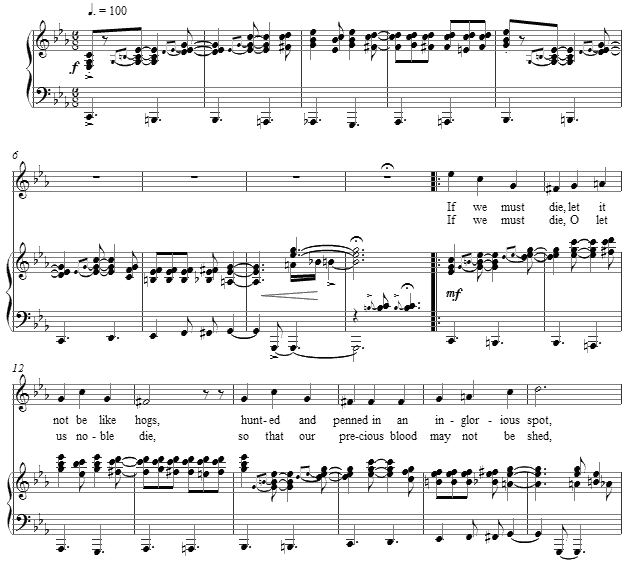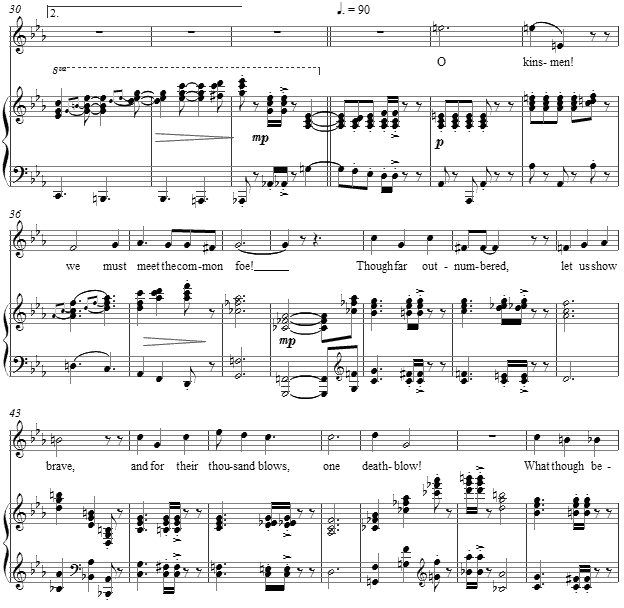Music and Texts of GARY BACHLUND
Vocal Music | Piano | Organ | Chamber Music | Orchestral | Articles and Commentary | Poems and Stories | Miscellany | FAQs
If We Must Die - (2010)
Claude McKay
for medium voice and piano
If we must die, let it not be like hogs
Hunted and penned in an inglorious spot,
While round us bark the mad and hungry dogs,
Making their mock at our accursed lot.
If we must die, O let us nobly die,
So that our precious blood may not be shed
In vain; then even the monsters we defy
Shall be constrained to honor us though dead!
O kinsmen! we must meet the common foe!
Though far outnumbered let us show us brave,
And for their thousand blows deal one death-blow!
What though before us lies the open grave?
Like men we'll face the murderous, cowardly pack,
Pressed to the wall, dying, but fighting back![ 3 pages, circa 1' 55"]
Claude McKay
The text is drawn from the collection of 74 poems, Harlem Shadows, The Poems of Claude McKay. New York: Harcourt, Brace and Company, 1922. It expressed within the context of the Harlem Renaissance growing awareness of black conditions after the civil war and through the Jim Crow laws which originated in the Northeastern states of the US. That lynching was an act of terror in that time goes without question, and McKay reacts to this with a call to fight back. Only decades later, the uprising by Jews "pressed to the wall" in the Warsaw ghetto against the Nazis was a similar expression of "fighting back."
I side with McKay as I side with the Jews of the Warsaw ghetto, as with the uprising of the poor against oppression and in direct opposition to the modern Western toying with words which conflates "war" with "terror," as did recently-deceased academic Howard Zinn [ 1 ], one among a chic group which adopted a historically political yet morally relative argument hardly worthy of classrooms and interviews, but unworthy of such sentiment as we learn from McKay's urgent, marching words. "Fighting back" is fighting back, and sometimes it is not only necessary but wholly moral and life-affirming. One does not end war nor terror with surrender, unless one wishes to enlist in the ranks of the defeated alongside those who adopted some self-inflicted inability to fight back throughout history. Claude McKay's is a uniquely American call to arms born in fires of the Harlem Renaissance of the early twentieth century New York, not an urge to surrender.
Nelson Miller, one of the editors of the Poets' Corner, writes, "Although written in response to the race riots of 1919 in Chicago and other American cities, it was read 20 years later by Winston Churchill to Parliament at the height of the Battle of Britain. It could just as easily have come from Kosovo or East Timor, or been spoken 3,000 years ago by Homer's character Hector in The Iliad. Times and places change, but human emotion remains constant."
The setting is a set of large arches, the vocal line set off against the 6/8 of the accompaniment in its own, contrarian 3/4 gestures. For this, the vocal line should be characterized with an overt aggressiveness, a dramaturgy to portray becoming ready to stand up to the proverbial bully, whether an individual, lynch mob or oppressive government.
The AABA form's middle section is set off against the outer stanzas with lesser dynamics and a meno mosso as well as textural differences. The reprise of the first gestures carries McKay's stern urging to fight "like men." For this, a portion of the poem's opening lines completes the song lyric with a hard final lunga chord.
The score for If We Must Die is available as a free PDF download, though any major commercial performance or recording of the work is prohibited without prior arrangement with the composer. Click on the graphic below for this piano-vocal score.
NOTES
[ 1 ] For more on this particular subject and another poet who clearly saw freedom as in opposition to government's central authority, please review comments which accompany my setting of Erich Mühsam's Gesang der Intellektuellen and Gesang der jungen Anarchisten.
I find it more than interesting that Claude McKay's forceful call to resist - "Like men we'll face the murderous, cowardly pack, / Pressed to the wall, dying, but fighting back!" -- can be so easily contrasted with the utter yet horrid inanity of seemingly seminal 20th century voices. One such example is playwright George Bernard Shaw, a Fabian Socialist by party affiliation, who essentially called for what McKay might have seen as state "lynching."
Shaw said, “I don’t want to punish anybody but there are an extraordinary number of people whom I want to kill. I think it would be a good thing to make everybody come before a properly appointed board, just as he might come before the income tax commissioner. And say every five years or seven years – just put them there and say – Sir, or Madam, will you be kind enough to justify your existence. If you’re not producing as much as you consume or perhaps a little more then clearly we can not use the big organization of our society for the purpose of keeping you alive because your life does not benefit us and it can’t be of very much use to yourself.”
For those who wish to construct an apologia for such a eugenic expression of "socialism," the original statement is more than individual. It is genocidal, and came from the architect of Scientific Socialism. "The chief mission of all other races and peoples, large and small, is to perish in the revolutionary holocaust." Karl Marx, in Die Neue Rheinische Zeitung NZR January 1849.
When comparing such overt and murderous racial prejudice as Marx evidenced, and the modern-day foolishness of academics like Zinn, one would do well to revisit the wisdom of Mill, who wrote:
"War is an ugly thing, but not the ugliest of things: the decayed and degraded state of moral and patriotic feeling which thinks nothing worth a war, is worse. When a people are used as mere human instruments for firing cannon or thrusting bayonets, in the service and for the selfish purposes of a master, such war degrades a people. A war to protect other human beings against tyrannical injustice; a war to give victory to their own ideas of right and good, and which is their own war, carried on for an honest purpose by their own free choice--is often the means of their regeneration. A man who has nothing which he cares about more than he does about his personal safety is a miserable creature who has no chance of being free, unless made and kept so by the existing of better men than himself. As long as justice and injustice have not terminated their ever renewing fight for ascendancy in the affairs of mankind, human beings must be willing, when need is, to do battle for the one against the other." In The Contest in America, pp. 208-09, in John Stuart Mill, Dissertations and Discussions (Boston: William V. Spencer, 1867).
McKay's marching poem is a direct descendant of Mills' cogent argument, and a direct challenge to the topsy-turvy, feel-good illogic of the modern pacifist, for true social justice involves " fighting back!"


